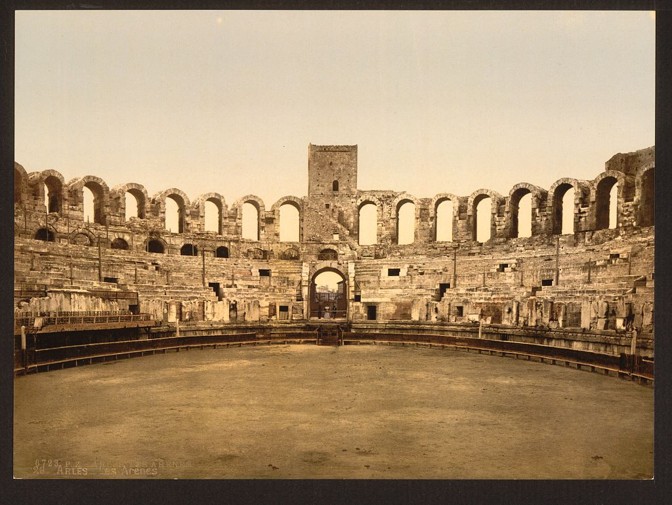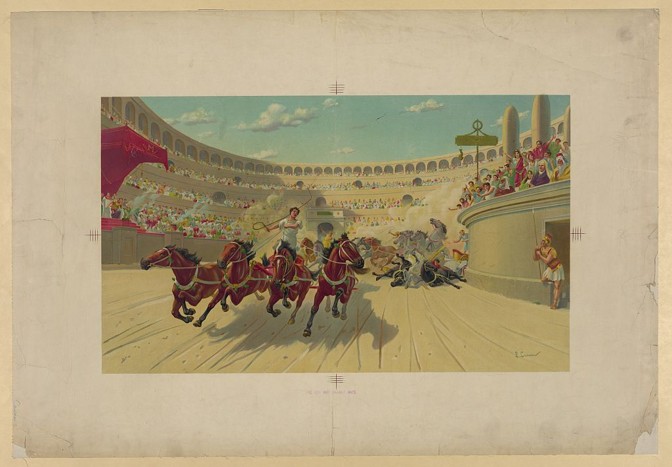The new print issue of the magazine has a short thought-experiment article, by me, on what happened after the fall of the Roman empire. (As I point out, this concerned the Western empire only—the one based in Italy, and the one Edward Gibbon described in The Decline and Fall. The Eastern empire, based in Constantinople, had many more centuries to run.)
In a first round of reader responses, historians and others reacted (mainly) to the article’s (intentionally overstated) headline, “The End of the Roman Empire Wasn’t That Bad.” And in a second round, a veteran of governance issues named Eric Schnurer argued that a renewed focus on local-level renewal and innovation was proper, since localities were the only places where innovation had ever occurred.
Here is another round, on the point I mainly hoped the article would raise: how Americans, ever optimistic about the rebound capacity of their perpetually self-reinventing system, should think about the possibility that “it’s different this time,” and that national-level governance might finally be strained beyond its rebound abilities. Over to the readers:
1) Civil servants still want to serve. In my article I quoted Philip Zelikow, of the University of Virginia, on the difference between national-level and local officials. At the state, local, and regional level, Zelikow said, elected and career officials have no choice but to work together and actually solve problems. Whereas at the national level, politics is more and more about culture war—“who you like, who you hate, which side you’re on,” as Zelikow put it.
A career official at a national-level agency replies:
In November, I will mark 32 years of federal service.
My grandparents came here with nothing. I’m an age of rising tides; my parents had the grit and good fortune to grant me and my brothers and sisters every reasonable opportunity, and then some.
That’s fundamentally why I entered public service, and that’s fundamentally why I remain in public service. I am grateful, and feel a responsibility to give back.
Your essay, comparing our federal state to Rome in its age of decline, strikes a chord, and in doing so fills me with an undeniable melancholy.
I push back against Zelikow’s “which side are you on” fatalism about national governance, even as I admit I see evidence of it all around me.
I’m not tossing in the towel yet.

2) “Optimates” vs. “Populares”: The battle goes on. From a history professor of my own Boomer generation:
I have been thinking about that [Roman] period quite a bit lately, as we see the collapse of societal norms and the failure of many central governments to actually govern.
I see the present as actually more in parallel to the fall of the republic in the first century B.C.E.
At that time, the empire had begun to take form, with vast amounts of wealth pouring into the center, but mainly enriching the senatorial oligarchs. The men who had fought the wars were forced off their land, which came to be farmed on vast plantations by slaves. The new global order failed the yeomen, mainly because the rich, who controlled the government, refused to relinquish any of their wealth to help the impoverished citizens.
Seems familiar.
The society broke into two warring parties: Optimates and Populares (the “Best” and the “People”). They engaged in wars with each other, mobilizing personal armies, and violence came to be used as a means of government with leaders of each side being killed by mobs, culminating in the death of Julius Caesar. The society had become so divided that in the end, the only way to govern was by autocratic rule: Augustus.
I fear that we are near that point, and that a demagogue will arise who has more shrewdness than our current demagogue-wannabe. Trump has blazed the pathway that others can well follow.
Trump’s party represents the Optimates—the wealthy—but we could just as well see a leader representing the Populares come to power. Think if Huey Long had been successful in the 1930s. Populism can cut both ways; call them national populism and social populism …
We are seeing the breakdown of liberal democracy across the world, as happened in the 1930s. It was finally restored after a decade of slaughter. It may not be restored again. At the least, something new has to take form, and that will not come from our generation.
One interesting parallel to the period that you do discuss in your piece is that the “barbarians” were not invading the empire to loot and pillage. Mainly, they wanted to share in the wealthy and stable Roman society, get a bit of land for their people, and be secure from tribes like the Huns on the other side of the border. They knew Rome very well; many of their leaders had been leaders in the Roman armies, and many were Roman citizens. The Vandals were not really that vandalous …
In the same way, people are now migrating en masse into Europe and the U.S. in pursuit of better lives, to participate in the wealthy and stable Western societies, to escape poverty and brutality.
Climate change plays a significant role in driving people out of their homelands, and that will only become worse over time. Another factor, of course, is Western as well as internecine wars (think Iraq and Syria), and Western support of brutal governments (Central America).
But the influx of a mass of outsiders into the Roman empire (especially the western part) did ultimately lead to the breakdown of the wealth and stability they had come for.
There were many reasons for this, including intertribal battling among the newcomers and the disappearance of the Roman legions as a controlling force, but there was a continuing social disintegration and insecurity. The stable Roman civitas crumbled, quickly in some places (Britain) and more slowly in others (Gaul). I am not bringing this up to agree with Trump’s mantra to “build the wall” (which is folly—the Romans tried in some places), but rather to stress that we must have a rational immigration policy and consensus that prevents destabilization. Mass immigration creates nationalist anger, which is fuel for nationalist demagogues.
As the Roman society disintegrated, government did become ever more localized. That worked for a while in some places (like France), but in time trade shrank, education declined, government services passed away, and instability increased.
One could imagine some parts of the U.S. doing quite well for a time without a federal government, but other parts might do very poorly. Infrastructure would fall apart, as it did in post-Roman Europe. More people would flow across unpoliced borders, adding to the disruption and to the reactions. This would not play well in a society as well armed as the U.S.
No one knew that “Rome had fallen” when Odoacer brushed aside the grandly named Romulus Augustulus in 476, only that the Germans now ruled Italy in name as they had in fact for the past decades. Even in our own long lives, can we know what history might see as having passed in our lifetimes, perhaps that we are now at the transition from the 500-year Modern Age into what-we-do-not-know (as John Lukacs has written)? Life went on, as for the frog in boiling water whom you have analyzed …
Several hundred years after the fall of Rome, new forms and new states began to take shape amid the ruins, and by the 12th century, western Europe was again thriving. But it was a long and difficult time between the fall of the empire and the rise of Europe. I would not wish that on my children and grandchildren, or on theirs.
The long-term results of the failure of governance we are living through will be regrettable, though perhaps as necessary as the Dark Ages.
3) The new corporate “nationality.” A Westerner who has lived for years in Japan writes about the local-versus-national tensions within the United States:
One idea is to reorganize the 50 states into seven regions that match the baby bells created when AT&T was broken up … The merits to such a reorganization are to unify many basic services: Do we really need 50 DMVs and 50 Medicaid programs and who knows how many other layers of bureaucracy that get repeated state by state? This could enhance basic services at the subnational level … On the other hand, it may create the equivalent of seven proconsuls competing among themselves to follow Rome’s decline into empire …
What seems more likely to me to occur over the next 50 years, and something that I oppose, is a rift, with sovereign-individual stance married to the corporatization of society …
Instead of citizenship being based on contiguous borders, our lives are bounded by what membership card(s) we carry. I can go to an Amazon condominium after buying dinner at Whole Foods paid for by my Amazon coins via my Kindle and travel in my Amazon car ad infinitum. And if I am a Sapphire member, better deals as I jump from location to location but stay in the Amazon or Apple or Goggle or Facebook or whatever bubble. When a person uses an “out of service” provider, of course rates go up, and pity the people who cannot afford/are rejected in their membership bids. Blade Runner marries Brave New World.
Finally, on the question of if this time is different compared with other times due to change! change! change! Yes and no. I believe that in past periods, starting around 1870, in these early periods, the degree of change was much greater than now. No electricity versus Wi-Fi and rechargeable batteries; no telephones/movies/radios versus watching reality TV on your cellphone, etc., etc.
But the pace of change does seem to be much faster and disconcerting for all generations. This deserves further explanation, but who has the time to read, let alone write … ?

4) Let’s talk about ideology, and class. Another academic writes (in a message I am substantially boiling down):
1) I have spent the past seven years studying the Eastern Roman empire, which is usually called “Byzantium,” and which Gibbon himself dismissed as basically the 1,000-year decline of the Roman empire.
His is a monstrous oversimplification, and it has degraded our understanding of ancient/medieval history ever since Gibbon’s own day (1776), just as Adam Smith’s dismissal of the timelessness of mercantilism has degraded our English-speaking understanding of ancient/medieval economics ever since the same time (1776). [JF note: On the Adam Smith point, check out this article, by me, from 25-plus years ago.]
Given what is already well known about how the U.S. so-called Founding Fathers (itself an egregious simplification of the revolutionary generation) understood the transition of republican Rome into the empire, before we sink our teeth into late-antique history, it might be worth remembering that our understanding of the past, especially the more distant past, is ALWAYS (and has always been) subject to the political machinations of the present, and even historians’ own careers aren’t guided so much by how well they interpret the past, but by how well their interpretations suit the sensibilities of the times in which they happen to be writing …
[JF note: Leaving out point No. 2, a long discourse on the difficulty of understanding the real life of peasants in different eras of history.]
3) Generations are important for understanding deep history. For the past 70 years, young generations of Americans have been told that they ought to be living better than their parents. That was fine for the Boomers and for Gen Xers, but this is clearly not the case for Millennials.
So we were lied to. Big surprise. So were the generations who fought for and against Prohibition, slavery, and Unionization (and for Odoacer as well, arguably). Why else would (according to the 1860 U.S. census) a majority of non-slave-owning Southern whites sign up to fight for the cause of Confederate slavery at the outbreak of the American Civil War? …
4) Let’s not forget the power of ideology in the present. In the fifth-century present, Christianity (and Judaism and the various forms of Paganism) was as much part and parcel of social cornerstones as the ideology of the “American dream,” “intersectionality,” and “MAGA” is today …
The point is that we should never underestimate the power of ideology to bind people to a common cause, whether in the fifth century, the 11th century, or the 21st century. Ultimately, we as historians dismiss the significance of religion (and collective conviction) at our own peril.
5) Finally, class. With the rapid adoption of Christian laws and social structures throughout the Roman empire during and after the fourth century, the rigid laws fossilized a system of landowners (fief holders) and land workers (peasants).
The road to serfdom is something that ever since Hayek has been capitalized by the likes of Ayn Rand and her disciples, but it truly begins with the rules that one class lives by and another class lives above.
This may sound quite Marxist, but that’s because it is. Without centralized regulations, we automatically return to a system of landowners and toilers, whether we call them ancient/medieval sharecroppers or modern bartenders. When ideology is co-opted by the elites to perpetuate their children to inherit their elite status (whether we call it aristocracy or meritocracy), we return to the so-called Dark Ages.
This is not simply “Marxism”; it is historical materialism. And it is the only actually reliable guide to studying the past that we have ever truly innovated since the time of Marcus Aurelius.

5) “I believe in America.” And, finally, quite a different view of the ever present, ever reinterpreted past:
As the famous first line in the movie The Godfather reads, “I believe in America.”
While many of us continue to do so, an alarming number of Americans have fallen victim to the in-vogue critique that “woe is me” and things are awful.
For some, this is a reality. I read stories about the homeless problem in major U.S. cities, how drug addiction and tolerance of theft are literally robbing thriving communities of their once-proud fortitude of citizenship. I read daily how Big Tech companies are continuing to mislead the American public about how they monitor and police speech and content their employees regard as offensive, and God knows what with our personal information …
But what I mostly don’t see now is pride—pride in how fortunate we are to live in this country. It’s called gratitude …
Talk to someone middle-aged who grew up in Soviet Eastern Europe, and you’ll find out quickly why they left for America. We now live in a world where we can get anything we want, at any time of the day. Nearly all buildings and houses have central air-conditioning. Transportation is readily available for everyone. The economy is currently booming with employment we haven’t seen in three generations. Murder rates are at all-time lows. There hasn’t been a serious threat to the homeland in 19 years. There’s a new superhero movie out every three months in theaters. Netflix programming has people indulging on their couches more than ever.
Most people who are angry and disheartened have never known a world like the Dark Ages, the Black Plague, serfdom, smallpox, the Great Depression, WWII, or even the height of the Cold War. And we have room to complain that America sucks?
One of the reasons the Roman empire fell was not because of physical overextension by the state (which is true), but by its people taking for granted what the Roman empire had done for the modern world …
Is it any coincidence many of the founding era sought to emulate Roman law and antiquity as they established the republican virtues and culture of the 1780s to the 1820s? And what’s more, many of the Founders warned, much like the scholars of latter-day Rome, what would likely be the downfall of the continent and our country: indifference and ingratitude from within for what America meant as an idea …
The truth, in my opinion, is that 9/11 sapped us of our confidence. And the ensuing years of lies, mismanaged wars, and bank bailouts; an incoherent foreign policy over multiple administrations; and now the rise of brash and offensive populism in both ideological camps have Americans feeling more anxious than ever …
Perhaps we should be devoting much more to teaching civics again, and appreciating the separation of powers, appreciating why men like James Madison, George Mason, John Adams, Gouverneur Morris, Benjamin Franklin, Thomas Jefferson, and George Washington matter so much that it is in our individual interest to be informed of who they were and what they did to establish the freedoms we often take for granted.
More so, it’s about time we recognize African American contributions during the founding era, too. In spite of their plight, we should be recognizing Peter Salem, Phillis Wheatley, James Armistead Lafayette, and James Forten. We should be embracing the fact that the Continental Army of 1781 was color-blind; that it stood about one-fifth African American at the Siege of Yorktown is extraordinary. Or that women and some African Americans were voting in New Jersey prior to 1807…
When we stop paying attention to all of the noise, and when we regain our focus, the fog will begin to clear, and King’s pronouncement of seeking to reach “the promised land” will once again ring loudly for those of us who are yearning for a more perfect union: one of freedom and liberty for all.
Thanks to all for responding to the thought experiment with thoughts, evidence, and opinions.